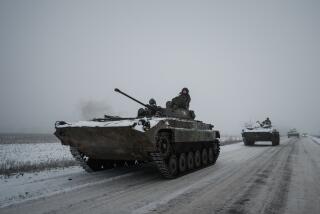Bush Hopes Gorbachev, Reforms Survive : Superpowers: The President cites ‘enormous dimensions’ of Azerbaijani problem but avoids criticizing crackdown.
WASHINGTON — President Bush refused comment Wednesday on whether Soviet President Mikhail S. Gorbachev is in jeopardy because of the violent upheaval in Azerbaijan, but he said he firmly wants Gorbachev to survive and continue his reform policies.
Asked at a wide-ranging morning news conference if Gorbachev has “gone too far” in cracking down with Soviet troops on Azerbaijani nationalists, Bush said: “The answer . . . unfolds every day. We don’t really know. And it’s serious.”
The President did not indicate any new approach toward Moscow in the wake of its use of force in the strife-torn region. He has broadly supported Soviet efforts to restore order in ethnic conflicts like that between Azerbaijanis and Armenians, while cautioning that forcible suppression of demonstrations for independence in the Baltic states would bring strong American criticism and might chill U.S.-Soviet relations.
In the Azerbaijan insurrection, which began as an ethnic dispute but climaxed in pogroms against Armenians, Bush pointed out sympathetically that Gorbachev is “faced with . . . an internal problem of enormous dimensions.”
“I can’t make any predictions,” he said, “but I know I hope that he not only survives but stays strong, because I think it is in our interest that perestroika (Gorbachev’s reform program) succeed and go forward.”
At the same time, Bush said the United States supports the Baltic states of Estonia, Latvia and Lithuania in their “independent pursuit of their own destiny.” He said Gorbachev is “sorting out some very difficult internal problems in these three Baltic countries.”
The United States recognized the Soviet Union and its territorial integrity in 1933, when Azerbaijan was already part of that country. The Baltic states were forcibly incorporated into it in 1940, after a secret Soviet-Nazi pact, and the United States has never recognized their annexation.
In his recent visit to the Baltic region, Gorbachev appeared to hold out prospects that the three states could eventually secede--but at the end of a long legal process, including a possible Soviet-wide referendum and the negotiated settlement of economic and other ties built up over the past 40 years.
Asked to explain the differences between U.S. policy regarding the Baltic states and areas like Azerbaijan, Bush said: “I don’t think it helps facilitate things for us to fine-tune all that. They know our position.” The issue was discussed during the U.S.-Soviet summit in Malta last month, the President said.
On another East-West issue, Bush turned a cold shoulder to a proposal by the new reform leader of Czechoslovakia, Vaclav Havel, for the next U.S.-Soviet summit to be held in his country. Havel’s aim presumably is to demonstrate that Prague intends to become a neutral nation like Finland, where U.S. and Soviet leaders can meet, rather than remain part of the Soviet Bloc.
“I don’t believe that it’s going to work for this summit,” Bush said.
The next summit, set for late June in Washington, will deal with finishing work on various arms control agreements, including a treaty to reduce offensive nuclear weapons.
The President, while expressing great respect for Havel, indicated that he did not want plans for his next meeting with Gorbachev to be changed in any way that might derail a successful outcome.
Meanwhile, State Department officials said that Secretary of State James A. Baker III will delay a scheduled visit to Moscow by one day because of an emergency meeting of the Soviet Communist Party’s Central Committee.
Baker originally was scheduled to visit Moscow Feb. 6 and 7. But the Soviet leadership has scheduled a meeting that week on the crisis in Azerbaijan and other areas, so Baker agreed to change his visit to Feb. 7 and 8.
Baker’s visit is intended to break several logjams in U.S.-Soviet arms control negotiations and to prepare for the June summit between Bush and Gorbachev.
More to Read
Get the L.A. Times Politics newsletter
Deeply reported insights into legislation, politics and policy from Sacramento, Washington and beyond. In your inbox three times per week.
You may occasionally receive promotional content from the Los Angeles Times.









